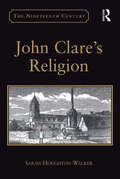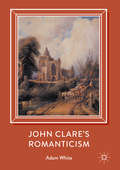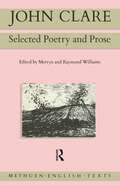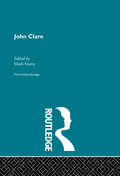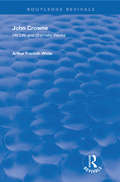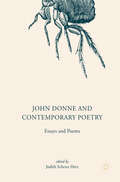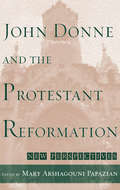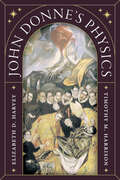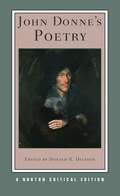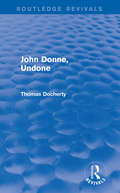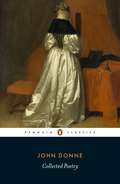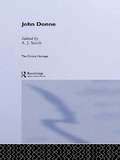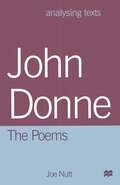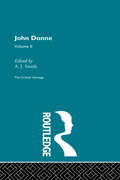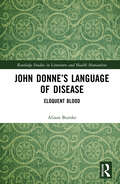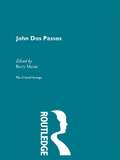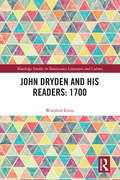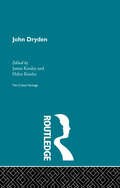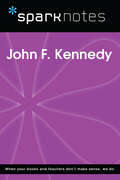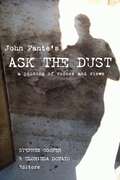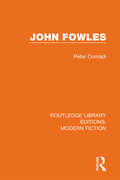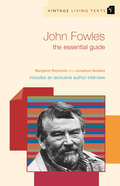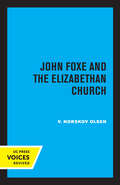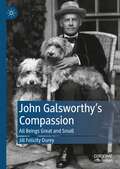- Table View
- List View
John Clare and Community
by John GoodridgeJohn Clare (1793-1864) is one of the most sensitive poetic observers of the natural world. Born into a rural laboring family, he felt connected to two communities: his native village and the Romantic and earlier poets who inspired him. The first part of this study of Clare and community shows how Clare absorbed and responded to his reading of a selection of poets including Chatterton, Bloomfield, Gray and Keats, revealing just how serious the process of self-education was to his development. The second part shows how he combined this reading with the oral folk-culture he was steeped in, to create an unrivaled poetic record of a rural culture during the period of enclosure, and the painful transition to the modern world. In his lifelong engagement with rural and literary life, Clare understood the limitations as well as the strengths in communities, the pleasures as well as the horrors of isolation.
John Clare's Religion (The\nineteenth Century Ser.)
by Sarah Houghton-WalkerAddressing a neglected aspect of John Clare's history, Sarah Houghton-Walker explores Clare's poetry within the framework of his faith and the religious context in which he lived. While Clare expressed affection for the Established Church and other denominations on various occasions, Houghton-Walker brings together a vast array of evidence to show that any exploration of Clare's religious faith must go beyond pulpit and chapel. Phenomena that Clare himself defines as elements of faith include ghosts, witches, and literature, as well as concepts such as selfhood, Eden, eternity, childhood, and evil. Together with more traditional religious expressions, these apparently disparate features of Clare's spirituality are revealed to be of fundamental significance to his poetry, and it becomes evident that Clare's experiences can tell us much about the experience of 'religion', 'faith', and 'belief' in the period more generally. A distinguishing characteristic of Houghton-Walker's approach is her conviction that one must take into account all aspects of Clare's faith or else risk misrepresenting it. Her book thus engages not only with the facts of Clare's religious habits but also with the ways in which he was literally inspired, and with how that inspiration is connected to his intimations of divinity, to his vision of nature, and thus to his poetry. Belief, mediated through the idea of vision, is found to be implicated in Clare's experiences and interpretations of the natural world and is thus shown to be critical to the content of his verse.
John Clare's Romanticism
by Adam WhiteThis book offers a major reassessment of John Clare's poetry and his position in the Romantic canon. Alert to Clare's knowledge of the work of his Romantic contemporaries and near contemporaries, it puts forward the first extended series of comparisons of Clare's poetry with texts we now think of as defining the period - in particular poems by Robert Burns, William Wordsworth, Lord Byron, and John Keats. It makes fully evident Clare's original contribution to the aesthetic culture of the age by analysing how he explores a wide range of concerns and preoccupations which are central to, and especially privileged in, Romantic-period poetics, including 'fancy', the sublime, childhood, ruins, joy, 'poesy', and a love lyric marked by a peculiar self-consciousness about sincere expression. At the heart of this book is the claim that the hitherto under-scrutinised subjective stances, transcendent modes, and abstract qualities of Clare's lyric poetry situate him firmly within, and as fundamentally part of, Romanticism, at the same time as his writing constitutes a distinctive contribution to one of the most fascinating eras of English literature.
John Clare: Selected Poetry and Prose (Routledge English Texts)
by Raymond Williams John Clare Merryn WilliamsFirst published in 1986. Routledge is an imprint of Taylor & Francis, an informa company.
John Clare: The Critical Heritage (Critical Heritage Ser.)
by Mark StoreyThe Critical Heritage gathers together a large body of critical sources on major figures in literature. Each volume presents contemporary responses to a writer's work, enabling students and researchers to read for themselves, for example, comments on early performances of Shakespeare's plays, or reactions to the first publication of Jane Austen's novels.The carefully selected sources range from landmark essays in the history of criticism to journalism and contemporary opinion, and little published documentary material such as letters and diaries. Significant pieces of criticism from later periods are also included, in order to demonstrate the fluctuations in an author's reputation.Each volume contains an introduction to the writer's published works, a selected bibliography, and an index of works, authors and subjects.
John Crowne: His Life and Dramatic Works (Routledge Revivals)
by Arthur Franklin WhiteOriginally published in 1922, this book gives an account of the life and dramatic works of the now little known and less studied Restoration playwright, John Crowne. The study consists of three parts. In the first, the author has traced the life of Crowne more minutely than has hitherto been attempted. In the second discusses Crowne's plays' the date of production and publication, the circumstances connected with the writing, the sources, and the manner in which they are used. Finally, the third part is a critical summary of Crowne's tragedies and comedies and an estimate of his importance as a playwright.
John Donne and Contemporary Poetry
by Judith Scherer HerzThis collection of poems and essays by both poets and scholars explores how John Donne's writing has entered into the language, the imagination, and the navigation of erotic and spiritual desires and experiences of twentieth- and twenty-first-century writers. The chapters chart a winding path from a description of the Donne and Contemporary Poetry Project at Fordham University to an encounter with the Holy Sonnets to a set of modern holy sonnets and then through the work of a poet who used Donne's Devotions on Emergent Occasions to chart his own dying. There are further poems on sickness and recovery, an essay on Donne and disease that brings in the work of an Australian poet, and several chapters of poems with various Donnean echoes. Of the final four chapters, one places Donne in relation to another poet and one to the Psalms, followed by two chapters on Donne's speech figures and his poetics.
John Donne and the Protestant Reformation: New Perspectives
by Mary Arshagouni PapazianThis collection of thirteen essays by an international group of scholars focuses on the impact of the Protestant Reformation on Donne's life, theology, poetry, and prose.
John Donne's Physics
by Elizabeth D. Harvey Timothy M. HarrisonA reimagining of Devotions upon Emergent Occasions as an original treatment of human life shaped by innovations in seventeenth-century science and medicine. In 1624, poet and preacher John Donne published Devotions upon Emergent Occasions, a book that recorded his near-death experience during a deadly epidemic in London. Four hundred years later, in the aftermath of our own pandemic, Harvey and Harrison show how Devotions crystalizes the power, beauty, and enduring strangeness of Donne’s thinking. Arguing that Donne saw human life in light of emergent ideas in the study of nature (physics) and the study of the body (physick), John Donne’s Physics reveals Devotions as a culminating achievement, a radically new literary form that uses poetic techniques to depict Donne’s encounter with death in a world transformed by new discoveries and knowledge systems.
John Donne's Poetry: Authoritative Texts, Criticism
by John Donne Donald R. DicksonDickson (English, Texas A&M U.) presents texts of Donne's (1572-1631) poems that draw heavily on manuscript sources and are now considered authoritative by scholars. The critical essays are arranged in the same categories as the poems themselves: metaphysical poetry; satires, elegies, and verse letters; songs and sonnets; and holy sonnets and divine poems. A chronology of his life and work is included. Annotation ©2007 Book News, Inc., Portland, OR (booknews.com)
John Donne, Undone (Routledge Revivals)
by Thomas DochertyContemporary criticism of Donne has tended to ignore the historical culture and ideology that conditioned his writings, reinforcing the traditionally accepted model of the poet as a humanist of ethical, cultural and political individualism. In this title, first published in 1986, Thomas Docherty challenges this with a more rigorously theoretical reading of Donne, particularly in relation to the specific culture of the late Renaissance in Europe. Docherty locates Donne’s poetry at the crux of the various scientific, legal, domestic and rhetorical discourses that surrounded and informed it. With a broadly post-structuralist approach, this reissue will benefit literature students with an interest in the wider study and context of John Donne’s work.
John Donne: Collected Poetry
by John DonneRegarded by many as the greatest of the Metaphysical poets, John Donne (1572-1631) was also among the most intriguing figures of the Elizabethan age. A sensualist who composed erotic and playful love poetry in his youth, he was raised a Catholic but later became one of the most admired Protestant preachers of his time. The Collected Poetry reflects this wide diversity, and includes his youthful songs and sonnets, epigrams, elegies, letters, satires, and the profoundly moving Divine Poems composed towards the end of his life. From joyful poems such as 'The Flea', which transforms the image of a louse into something marvellous, to the intimate and intense Holy Sonnets, Donne breathed new vigour into poetry by drawing lucid and often startling metaphors from the world in which he lived. His poems remain among the most passionate, profound and spiritual in the English language.
John Donne: The Critical Heritage
by A. J. SmithThe Critical Heritage gathers together a large body of critical sources on major figures in literature. Each volume presents contemporary responses to a writer's work,enabling students and researchers to read for themselves, for example, comments on early performances of Shakespeare's plays, or reactions to the first publication of Jane Austen's novels. The carefully selected sources range from landmark essays in the history of criticism to journalism and contemporary opinion, and little published documentary material such as letters and diaries. Significant pieces of criticism from later periods are also included, in order to demonstrate the fluctuations in an author's reputation. Each volume contains an introduction to the writer's published works, a selected bibliography, and an index of works, authors and subjects The Collected Critical Heritage set will be available as a set of 68 volumes and the series will also be available in mini sets selected by period (in slipcase boxes), and as individual volumes.
John Donne: The Poems (Analysing Texts)
by Joe NuttJohn Donne's poems are some of the most challenging and stimulating in the English literary heritage. This book looks at the entire range of his poetic output, from the erotic to the divine, from satires to sonnets. Through detailed analysis of a large number of individual poems, Donne's intellectual vitality and unique poetic voice is entertainingly explored. The practical techniques are explained clearly, and when applied to the work of other poets, will enable the reader to feel confident in understanding and discussing even the most demanding verse.
John Donne: Volume II
by A.J. SmithContains writings about John Donne from 1873 to 1923, including Henry Morley, Edmund Gosse, W.F. Collier, Rudyard Kipling, Charles Eliot Norton, Henry Augustin Beers, Thomas Hardy, W.B. Yeats, Ezra Pound, T.S. Eliot, and many others. Together these works present a record of how, from the nineteenth century onwards, critics viewed Donne, and how he became part of today's literary canon.
John Donne’s Language of Disease: Eloquent Blood (Routledge Studies in Literature and Health Humanities)
by Alison BumkeJohn Donne’s Language of Disease reveals the influence of medical knowledge – a rapidly changing field in early modern England – on Donne’s thinking and writing. This knowledge played a crucial role in shaping how Donne understood his everyday experiences, and how he conveyed those experiences in his work. Examining a wide range of his texts through the lens of medical history, this study contends that Donne was both a product of his period and a remarkable exception to it. He used medical language in unexpected and striking ways that made his ideas resonate with his original audience and that still illuminate his ideas for readers today.
John Dos Passos: The Critical Heritage
by Barry MaineThis set comprises 40 volumes covering 19th and 20th century European and American authors. These volumes will be available as a complete set, mini boxed sets (by theme) or as individual volumes. This second set complements the first 68 volume set of Critical Heritage published by Routledge in October 1995.
John Dryden and His Readers: 1700 (Routledge Studies in Renaissance Literature and Culture)
by Winifred ErnstDryden at the end of his life was admired, perhaps even beloved, by many in England, and his greatest skill over his long career—his controlled detachment—uniquely positioned him to write of both history and politics in 1700. His narrative poetry was popular among Whigs and Tories, women and men, Ancients and Moderns, and his imitations suggest historical connections between the War of the Roses, the Civil War, and the Revolution of 1688. All of these events combined easily in the minds of Dryden’s contemporaries, and his fables, fraught with conflicted loyalties and family strife not unlike a nation divided, may have caught and compelled his readers in a way that was different from other miscellanies: Dryden may have articulated in beautiful verse the emotions of many in the midst of enormous historical change. Fables is a pivotal cultural text urging national unity through its embrace of competing voices.
John Dryden: The Critical Heritage (Oxford Standard Authors Ser.)
by James Kinsley Helen KinsleyThe Critical Heritage gathers together a large body of critical sources on major figures in literature. Each volume presents contemporary responses to a writer's work, enabling students and researchers to read for themselves, for example, comments on early performances of Shakespeare's plays, or reactions to the first publication of Jane Austen's novels.The carefully selected sources range from landmark essays in the history of criticism to journalism and contemporary opinion, and little published documentary material such as letters and diaries. Significant pieces of criticism from later periods are also included, in order to demonstrate the fluctuations in an author's reputation.Each volume contains an introduction to the writer's published works, a selected bibliography, and an index of works, authors and subjects.The Collected Critical Heritage set will be available as a set of 68 volumes and the series will also be available in mini sets selected by period (in slipcase boxes) and as individual volumes.
John F. Kennedy (SparkNotes Biography Guide)
by SparkNotesJohn F. Kennedy (SparkNotes Biography Guide) Making the reading experience fun! SparkNotes Biography Guides examine the lives of historical luminaries, from Alexander the Great to Virginia Woolf. Each biography guide includes:An examination of the historical context in which the person livedA summary of the person&’s life and achievementsA glossary of important terms, people, and eventsAn in-depth look at the key epochs in the person&’s careerStudy questions and essay topicsA review testSuggestions for further readingWhether you&’re a student of history or just a student cramming for a history exam, SparkNotes Biography guides are a reliable, thorough, and readable resource.
John Fante's Ask the Dust: A Joining of Voices and Views (Critical Studies in Italian America)
by Stephen Cooper and Clorinda DonatoThis volume assembles for the first time a staggering multiplicity of reflections and readings of John Fante’s 1939 classic, Ask the Dust, a true testament to the work’s present and future impact.The contributors to this work—writers, critics, fans, scholars, screenwriters, directors, and others—analyze the provocative set of diaspora tensions informing Fante’s masterpiece that distinguish it from those accounts of earlier East Coast migrations and minglings. A must-read for aficionados of L.A. fiction and new migration literature, John Fante’s “Ask the Dust”: A Joining of Voices and Views is destined for landmark status as the first volume of Fante studies to reveal the novel’s evolving intertextualities and intersectionalities.Contributors: Miriam Amico, Charles Bukowski, Stephen Cooper, Giovanna DiLello, John Fante, Valerio Ferme, Teresa Fiore, Daniel Gardner, Philippe Garnier, Robert Guffey, Ryan Holiday, Jan Louter, Chiara Mazzucchelli, Meagan Meylor, J’aime Morrison, Nathan Rabin, Alan Rifkin, Suzanne Manizza Roszak, Danny Shain, Robert Towne, Joel Williams
John Fowles (Routledge Library Editions: Modern Fiction #10)
by Peter ConradiJohn Fowles had gained great popularity as a contemporary novelist on both sides of the Atlantic. In this comprehensive study of his work, originally published in 1982, Peter Conradi relates his work to his life, his ideas and his place in contemporary English fiction at the time. Conradi sees him as both realist and experimental, and in detailed analyses of The Magus and The French Lieutenant’s Woman illuminates Fowles’s use of literary genres – the romance (in particular), the detective story, the thriller, the Victorian novel, the tale of courtly love – to exploit and explode the conventions of that particular genre. Seduction, erotic quest, capture and betrayal are among the most important themes in Fowles’s work to be considered here.
John Fowles: The Essential Guide (Vintage Living Texts #6)
by Margaret Reynolds Jonathan NoakesThe French Lieutenant's Woman, The Magus, A MaggotIn Vintage Living Texts, teachers and students will find the essential guide to the works of John Fowles. Vintage Living Texts is unique in that it offers an in-depth interview with John Fowles, relating specifically to the texts under discussion. This guide deals with Fowles's themes, genre and narrative technique, and a close reading of the texts will provide a rich source of ideas for intelligent and inventive ways of approaching the novels. Also included in this guide are detailed reading plans for all three novels, questions for essays and discussion, contextual material, suggested texts for complementary and comparative reading, extracts from reviews, a critical overview, a biography, bibliography and a glossary of literary terms.
John Foxe and the Elizabethan Church
by V. Norskov OlsenThis title is part of UC Press's Voices Revived program, which commemorates University of California Press’s mission to seek out and cultivate the brightest minds and give them voice, reach, and impact. Drawing on a backlist dating to 1893, Voices Revived makes high-quality, peer-reviewed scholarship accessible once again using print-on-demand technology. This title was originally published in 1973.
John Galsworthy’s Compassion: All Beings Great and Small
by Jill Felicity DureyThis book discusses John Galsworthy’s compassion for people and animals, in his fiction, non-fiction and drama. Initial chapters explore compassion in The Forsyte Saga and The Modern Comedy, and his parents’ influence. Other chapters examine his works helping prison reform, men and children disabled during the First World War, and people whose relatives were interned as war-time alien enemies. Two chapters focus on slum clearance and labour unrest during the twentieth century’s first three decades. Another two concentrate on animal welfare and vivisection. The final chapter attempts to appraise Galsworthy as a writer by looking at what commentators past and present have said, and at what constitutes literature.

